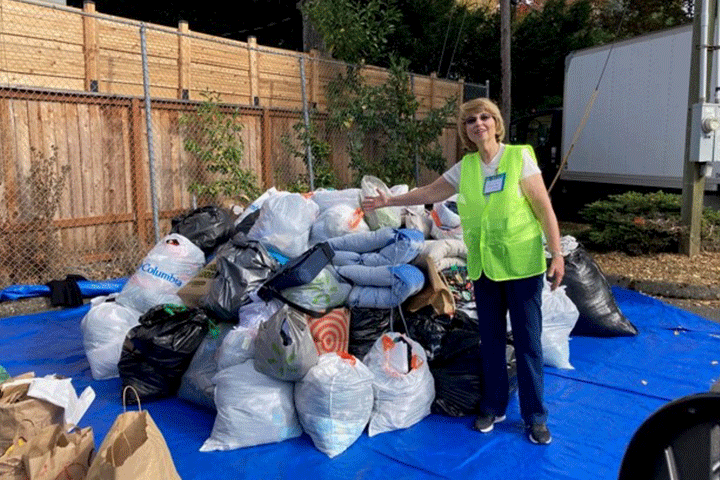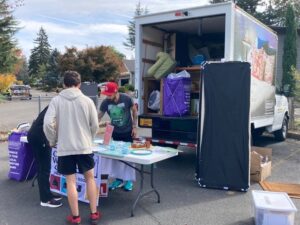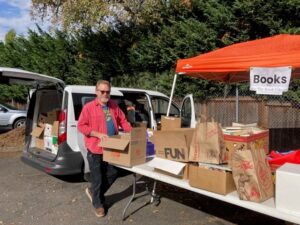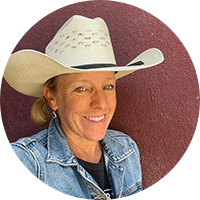2/5/2025
A Green Church: Valley Community Presbyterian’s Sustainable Impact
by Rev. Erin Dunigan

Valley Community Presbyterian Church in Portland, Oregon, is more than just a “green congregation.”
It is becoming a thriving hub of environmental consciousness and community engagement. Beginning with simple steps such as not using Styrofoam coffee cups after worship on Sundays, the church has made significant strides in its commitment to sustainability, transforming its own practices and inspiring the community to do so as well.
Ruthann Marquis leads the church’s Earth Care Team. “We had been taking baby steps, such as not using disposable at our coffee hours, creating a dishwashing team to handle the washing,” she said. But then in 2019 the team began to gather the information to apply to become an Earth Care congregation through the PC(USA).
To become certified as Earth Care Congregations, churches take the “Earth Care Pledge” and complete activities in the fields of worship, education, facilities and outreach. The recertification process for congregations is coming up: January 1 to February 15.
 Jessica Maudlin, Associate for Sustainable Living and Earth Care Concerns for the Presbyterian Church (U.S.A.), applauded the church’s dedication. “Valley is such a great example of how little things add up to big things. When each of our 331 Earth Care Congregations are faithfully living out our calling to be good stewards of God’s Creation in regards to our worship, outreach, education and facilities the impact is further reaching than we can imagine!”
Jessica Maudlin, Associate for Sustainable Living and Earth Care Concerns for the Presbyterian Church (U.S.A.), applauded the church’s dedication. “Valley is such a great example of how little things add up to big things. When each of our 331 Earth Care Congregations are faithfully living out our calling to be good stewards of God’s Creation in regards to our worship, outreach, education and facilities the impact is further reaching than we can imagine!”
Initially some of the changes brought a bit of pushback; ceramic coffee mugs were heavier to hold than the Styrofoam cups that had been the custom. “But people recognize that we all need to do what we can,” Marquis said.
Fast forward five years, and not only has the congregation taken these baby steps, but this fall they hosted their 8th community recycling event with more than 300 participants.
“This has been an opportunity where everything was available to recycle, not just the typical items that our waste haulers would take in the recycle bin,” she said.
Over the past five years, the church has developed relationships with various community organizations from a running company that recycles used running shoes (the good ones find new homes, the not so good get ground up and become sports courts) to a community warehouse that accepts home goods and furnishings and then uses those to equip houses and apartments for newly arrived immigrants or those who are leaving group homes.
A relationship with a local library means that people can bring any books and media that get repurposed by the library and a local used bookstore. Another local company collects usable textiles, shoes, handbags and other clothing items; the non-usable ones get diverted to become rags or stuffing.
shoes, handbags and other clothing items; the non-usable ones get diverted to become rags or stuffing.
In October the church welcomed more than 300 neighbors dropping off items. “Think of all the volumes of things that are not going into the landfill,” Marquis said.
In addition to the recycling component there is also an educational aspect to the day, including a master gardener to answer questions about composting and native plants.
“Through this the community has started to recognize us an eco-friendly church and they look forward to these events,” Marquis said. “About two years ago, we were in transition and our transitionpastor encouraged us to look at who we are — not who we used to be, but who we are now, what the world is like now. We realized that we want to engage with the community more.”
“As a church we have recognized that we are not going to have our pews overflowing, but we want to be the tangible visible hands and feet of Christ in our community,” she said. That realization has led to a more outward-facing focus, with more events in and for the community.
The recycling event now has a line of cars waiting to come in to drop off their items. “This tells me that people are beginning to think differently, and that is what I love about education,” Marquis said. “The more they know, the more choices they have.”
By embracing sustainability as a core value, Valley Community Presbyterian Church has not only reduced its environmental impact but has also strengthened its connection to the community.
“We’re not perfect,” Marquis admits. “But we’re making a difference, and we’re inspiring others to do the same.”

